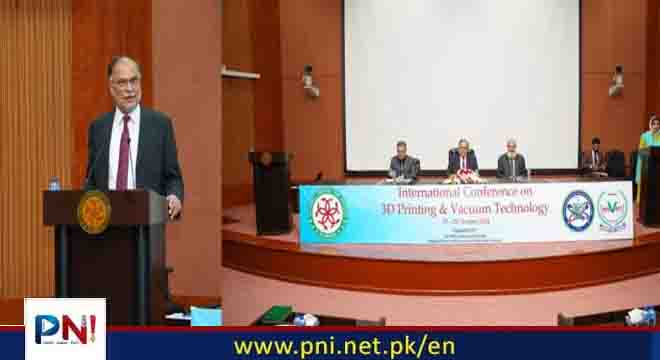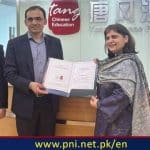ISLAMABAD, Oct 23 : Federal Minister for Planning, Development, and Special Initiatives, Professor Ahsan Iqbal on Wednesday inaugurated the First International Conference on 3D Printing and Vacuum Technology.
The National Center for Physics (NCP) at Quaid-i-Azam University hosted the inaugural session of the First International Conference on 3D Printing and Vacuum Technology, said a press release.
The three-day conference, running from October 23 to 25, 2024, will bring together more than 50 eminent researchers and scientists from around the globe to discuss the latest advancements in these transformative technologies.
In his keynote address, Federal Minister for Planning, Development, and Special Initiatives, Professor Ahsan Iqbal, emphasized the pivotal role of science and technology in driving national development and progress. He called on scientists, researchers, and innovators to work tirelessly to position Pakistan at the forefront of technological advancements.
Addressing the audience, which included esteemed figures like Dr. Ansar Pervaiz, Dr. Qaisar Ahsan, and Dr. Muhammad Maqsood, the Minister highlighted the profound potential of 3D printing and vacuum technology.
These innovations, he noted, are not just technological milestones but are catalysts for reshaping industries, redefining economies, and revolutionizing everyday life.
By enabling precise manufacturing in controlled environments, these technologies offer solutions across healthcare, aerospace, construction, and energy sectors, he said adding, “We are standing at the intersection of two remarkable innovations—3D printing and vacuum technology—that have transformed production, manufacturing, and research worldwide. This conference marks the beginning of Pakistan’s formal journey into the Fourth Industrial Revolution”.
Highlighting global examples of 3D printing and vacuum technology, the minister drew attention to remarkable achievements in healthcare, aerospace, and infrastructure.
He explained that 3D printing has made groundbreaking progress in healthcare, especially in bioprinting, where countries like the USA and Germany have pioneered the creation of living tissues, custom-designed implants, and prosthetics. He said that the aerospace and defense sectors have also benefited from these innovations, with NASA using 3D printing to manufacture rocket parts, reducing costs and enabling new possibilities for space exploration.
Minister Iqbal underscored Pakistan’s aspiration to enhance its space capabilities, in collaboration with agencies like SUPARCO, using similar technologies. In the construction sector, Dubai’s initiative to use 3D printing for 25% of its new buildings by 2030 was highlighted, with implications for affordable housing, while China’s rapid construction of entire neighborhoods using this technology was presented as another notable example.
He outlined the government’s vision for utilizing these technologies as part of the Five Es Development Framework, aiming to transform Pakistan into a trillion-dollar economy by 2035.
The minister detailed how 3D printing can play a crucial role in boosting exports, improving digital transformation through E-Pakistan initiatives, promoting environmentally sustainable manufacturing, enhancing energy efficiency, and empowering marginalized communities through accessible technological solutions.
Reiterating the government’s dedication to fostering a supportive ecosystem, the minister highlighted initiatives such as the Pakistan Innovation Fund and Centers of Excellence to drive innovation.
He stressed that progress would require collaboration among the government, private sector, academia and research institutions. The aim is to equip the youth with the necessary skills to lead in these emerging fields through universities, vocational institutes, and training centers, he added.
The minister stressed the importance of a stable political environment and policy continuity for Pakistan to fully capitalize on emerging technologies like 3D printing and vacuum technology. He pointed out that countries like Singapore, India, and Malaysia have successfully integrated these technologies by maintaining consistent governance and policies.
The minister also referenced the progress made under Vision 2025 from 2013 to 2018, which was hindered by policy reversals in subsequent years. “The success stories of other nations demonstrate that long-term stability is crucial for sustained economic growth. Pakistan must maintain policy consistency to prevent setbacks and ensure a steady path toward development,” he asserted.
He urged participants to embrace the tools and opportunities presented by 3D printing and vacuum technology, asserting that the nation’s progress is in the hands of its innovators.
He emphasized the importance of well-equipped libraries and laboratories that operate 24/7, inspiring the metaphor of illuminated library windows symbolizing the rise of brilliant minds dedicated to national advancement.
“We are not merely observers of technological change; we are active participants in shaping Pakistan’s future. Let us work together to ensure that Pakistan becomes a leader in this age of technological innovation,” he concluded.
The International Conference on 3D Printing and Vacuum Technology serves as a platform for knowledge sharing, collaboration, and networking among experts.
Over the next three days, participants will explore recent breakthroughs, applications across industries, advances in vacuum technology, and the challenges and opportunities in these fields.
Follow the PNI Facebook page for the latest news and updates.









